FA Cup: Colne back on the map as they face Gateshead
- Published
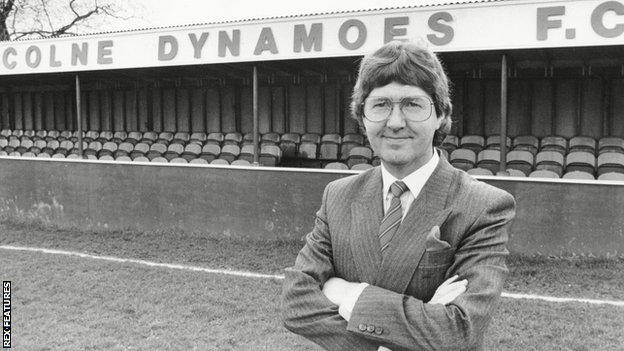
Graham White was Colne Dynamoes' millionaire chairman-manager in the 1980s
FA Cup fourth qualifying round |
|---|
Gateshead v Colne Date: Saturday, 19 October |
Coverage: Potters Bar Town v Barnet live on the Red Button, BBC Sport website and iPlayer from 12:30 BST on 19 October. |
"If things had gone differently, it could be the Dynamoes where Burnley are now," says Colne FC chairman Ryan Haigh.
In the east Lancashire town of Colne, just eight miles from Burnley, they still remember the extraordinary adventures of a non-league club with huge ambitions and - for a while - the finance to match.
They won the FA Vase at Wembley, they signed a European Cup winner to play at left-back, and at one stage, threatened to match their illustrious neighbours from Turf Moor.
And then, in 1990, Colne Dynamoes suddenly folded.
This is the story of a club who tried to redraw east Lancashire's football map, who caused a town with a population of just 20,000 to dream of hosting a Football League club.
But it is also a tale of the new team that grew in their place. On Saturday, Colne FC travel to Gateshead attempting to achieve for the first time something the Dynamoes never managed, by reaching the FA Cup first round.
'I didn't know where Colne was'
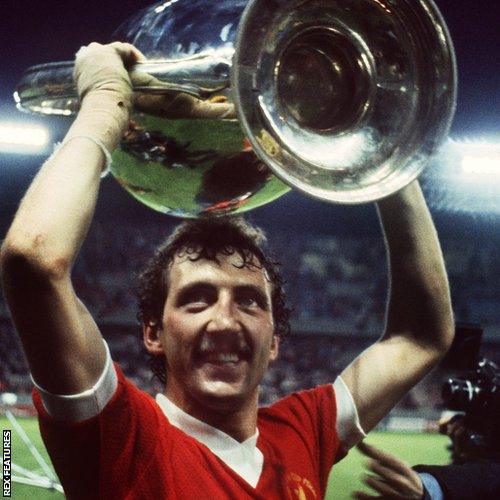
Alan Kennedy scored the winner in the European Cup final for Liverpool in 1981 - how did he end up playing in Colne?
Colne FC currently sit 16th in the Northern Premier League North West Division, the eighth tier of the English football pyramid. Neighbours Burnley are seventh in the Premier League.
In 1990, the gap between the two towns' football clubs was much smaller. Colne Dynamoes had just won the Northern Premier League - then the sixth tier - by 26 points. Burnley had finished 16th in the old Fourth Division, now League Two.
Graham White, Colne's ambitious millionaire chairman-manager, had even tried to buy Burnley in 1989.
White, nicknamed 'Chalky', had founded the Dynamoes in 1963 as a team for a few old school friends, and they played in the Lancashire amateur leagues before joining the English pyramid in 1982 as founder members of the North West Counties League.
When his property and timber businesses began to make significant money in the mid-1980s, White invested fortunes in the team, and they rose through the divisions. They beat Emley to win the FA Vase in 1988, then signed Alan Kennedy - twice capped by England, and twice a scorer in European Cup finals for Liverpool.
"When I told the lads from Liverpool that I was going to play for Colne, a couple of them had to ask me where it is," Kennedy says. "What are you going there for? But a couple of them said to me: Do they need a centre-half?"
The Dynamoes' ambition had become known in football circles - as had the scale of White's investment. In 1989, White took the club full-time, paying the players more than they could earn in the third tier. Staff were provided with club cars. The aim was to reach the Football League.
"They were one-offs really," Haigh recalls. "Signing former Liverpool and England players, they had their own commercial department sorting out cars for players - you would never see that now in non-league. It wouldn't happen now."
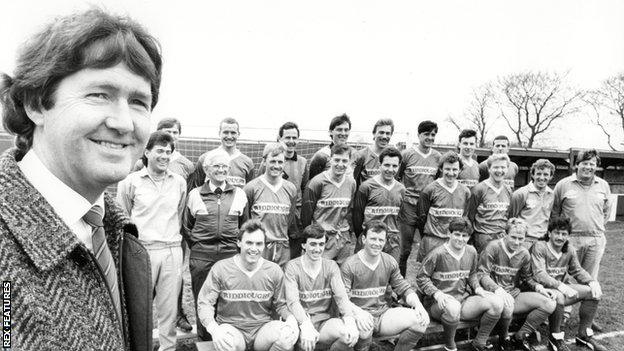
White and his Colne Dynamoes side in 1988
For Kennedy, serving as a taxi service for the club's younger players as he travelled in from Ormskirk every morning, it was a remarkable period.
"I loved my time there," Kennedy says. "It was seen as a progressive club. The only issue was I didn't know even roughly where it was - Colne is not a place you would go to. Colne was a strange old place. Wherever you are in Colne, you're on a hill. It was certainly an education for me.
"I didn't have too many other offers at the time, to be honest. It was an unstable part of my career. I didn't know where to go. I'd been abroad, to Belgium and Sweden. Nobody wanted a left-back.
"But I ended up going from Colne back into the Football League with Wrexham. They gave me a lifeline.
"Colne did it in the right way; they were paying good money, were top of the league."
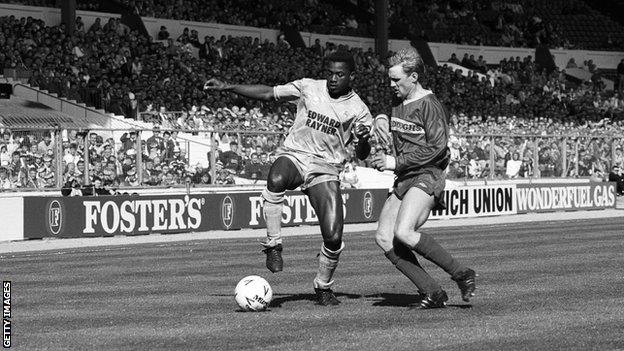
The Dynamoes even made it all the way to Wembley - beating Yorkshire side Emley in the 1988 FA Vase final
But as the Dynamoes ran away with the Northern Premier League title in 1989-90, a problem was brewing. The club's Holt House ground was not good enough for the National League, then known as the Conference. White tried, unsuccessfully, to arrange a groundshare with Burnley. He then publicised plans to build a new stadium on the edge of nearby Nelson, but they came to nothing.
"They just didn't have a suitable ground," says Kennedy. "If it wasn't for that, he [White] probably would have done what he set out to do.
"Burnley were struggling at the time. They were having a difficult period and Chalky thought about replacing them."
Having failed to find a suitable ground, the Dynamoes were refused promotion to the Conference in 1990. White, who had put hundreds of thousands of pounds into the club, had reached the limit of his investment. Days before the start of the 1990-91 season, he folded the club.
"It came to an end pretty suddenly," says Kennedy.
"They were looking to groundshare while they built their own ground and in the end they just ran out of money. The problem with Colne was we were attracting local people but we weren't bringing in people from elsewhere."
White has never spoken publicly about the Dynamoes' demise; Haigh recalls their history fondly, but with an acknowledgement of the necessity of moving on.
"We still have a few pictures up of the Dynamoes," Haigh says. "They are part of the club's history and will never be forgotten but we are a different club."
'The Football League? A step too far'
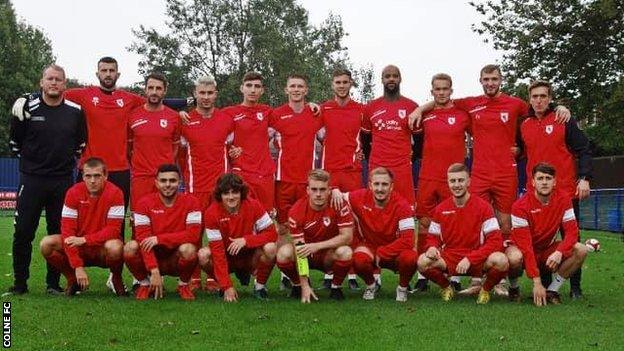
Colne FC play in the eighth tier of the English football pyramid
Colne FC were formed in 1996, and play at the Dynamoes' old Holt House ground. Just like the Dynamoes, they have ambitions, but they are tempered with realism.
"We took big gambles at the club this summer; we have gone over budget and got the players we wanted as we want promotion," says Haigh.
"It was a board decision. We know that we might have to put some money in at the end of the season but it's all part of our planning and investment."
If, on Saturday, they beat Gateshead - a team ninth in the National League North, two divisions above Colne - they will bank £18,750. Haigh estimates that could be "about 20%" of the club's turnover, before you even consider a first-round proper tie to come.
More than 200 fans are making the journey to the north-east of England, with the players being treated to a trip up on the first-team bus of Fleetwood Town, a club who succeeded in achieving what the Dynamoes strived for - rising from the foot of the non-league pyramid to League One.
"The Football League? It may be a step too far for us at the moment," Haigh says. "Our plans are to install a 4G pitch as it opens up so many revenue streams but that would obviously prevent us from playing in the league.
"Fleetwood are the model we are closest to. They have become a sustainable club in League One and yes, they have spent a lot of money on the ground and facilities but they have never gone crazy with wages like other clubs."
From FC Cologne to Colne FC
As a postscript to this story: Colne will have support from Germany's Bundesliga this weekend, thanks to a top-flight club with a similar sounding name.
When the club tweeted out a link to this article on Thursday, they received a response from FC Koln - whose anglicised name is FC Cologne. As you can see from the screengrab below, it read: "All the best for Saturday, fellas! Keep on going and keep on making history - what you've done thus far is incredible!"
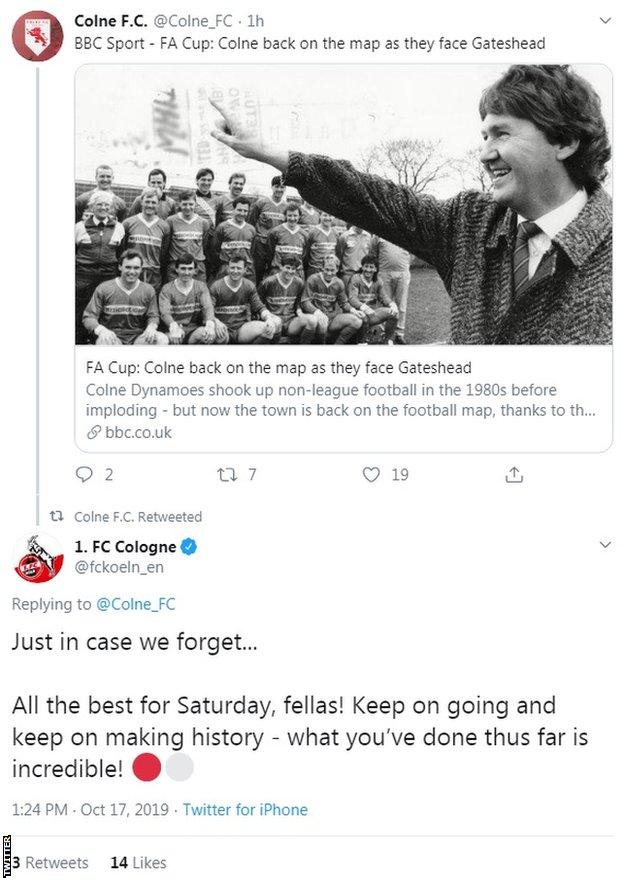
FC Cologne wish good luck to Colne FC